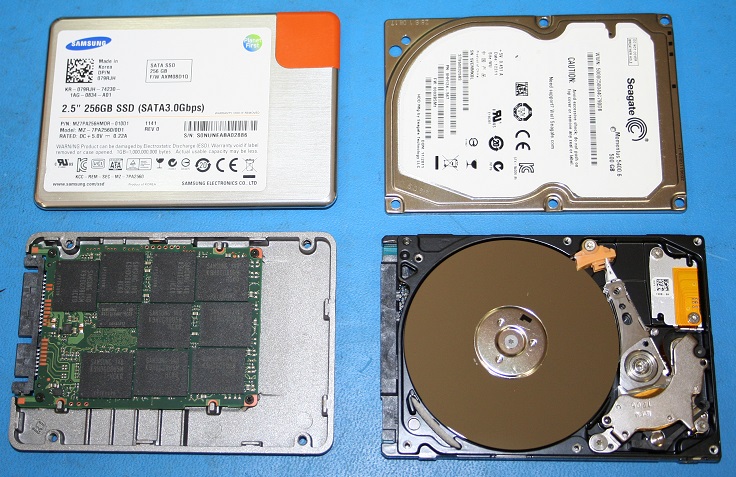
A question at EADR we get asked frequently by customers who have suffered data loss from a mechanical hard disk drive is “should I use a Solid State Drive instead?” In the majority of cases for data back-up and storage we would still recommend an external hard drive (mechanical) or if the data volume is small enough, a USB Flash drive. If you have just suffered data loss from one mechanical drive, why go down this route again? Why not a solid state drive?
Solid State Drive or Mechanical Hard Drive?
Solid state drives are known for their speed and performance. They are very different from mechanical hard drives in that there are no moving parts involved; no motor, head stack or platters. In solid state drives, data is stored on NAND based chips, so they are very quick to boot up and data access speeds are greatly improved. Their best application, therefore, is for housing an operating system and associated program files. The advantage of a solid state drive is that if they are dropped or suffer a shock then nothing can be easily broken. However, they are subject to their own types of failure, such as Firmware failures, the chips dying, the semi-conductors failing or other components wearing out. This can happen at any time and usually without any warning! With mechanical hard drives, although they can also go wrong and fail quite suddenly, this is often down to a trauma such as being dropped or knocked, or indeed being ejected from your laptop or computer incorrectly. From a data recovery perspective, if a solid state drive is extensively damaged and requires numerous chips to be removed, read and reconstructed, then costs can escalate. Purchase price is a factor too, at the time of writing, portable solid state drives are approximately twice the price of mechanical portable hard drives, so with mechanical, you definitely get more storage for your money. On the whole, mechanical hard drives, if used correctly and handled with care, are an excellent way of storing data. Although more vulnerable to damage, they are easier and cheaper to repair on a data recovery basis, and indeed replace with a new hard drive.
The ideal combination would be to use a Solid State Drive as your boot drive for your computer's operating system, with a mechanical hard drive to store your frequently accessed data away from your solid state drive. If it’s not practical to use this combination, then a very stringent backup routine would need to be put in place if you are solely relying on solid state drives. We frequently have clients that lose data from their SSD but haven't backed them up, assuming that they are far more robust than mechanical (spinning) hard drives. Whilst this may be the case in terms of their fragility, there is of course no substitution for having a good backup regime in place, whichever device you choose for data storage. Remember – If it’s your only copy, it’s not a backup, no matter where it’s stored… If you have suffered data loss from your solid state drive or mechanical drive, please feel free to call on 01953 667977 for an informal chat. We can talk you through the process, answer any questions you may have regarding price and turnaround times etc., and arrange for your device to be inspected.
